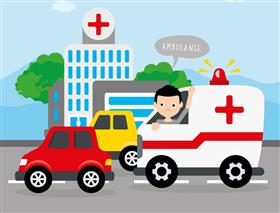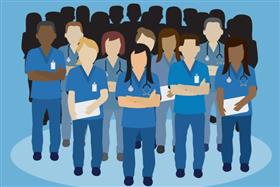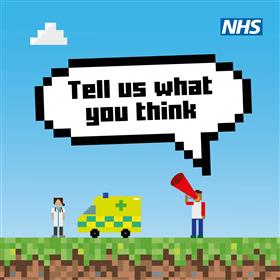| Welcome to the programme newsletter | Welcome to the Humber Acute Services programme newsletter. In it you'll find the latest news and updates about the programme, alongside information about how you can get involved, share your ideas or ask questions. It's also an opportunity to find out more about some of the people who are involved in this work.
In this edition, we have a number of different work areas across Programme Two (Core Hospital Services) that the Programme Team has been involved in, as the development of potential clinical models for future hospital services has continued.
We hope you will find this update helpful and interesting. | |

|
|
Using technology to deliver state-of-the-art health and social care
|
|
Utilising technology to deliver state-of-the-art health and social care is crucial when thinking about the future of health and care and is an important part of the Humber Acute Services Programme.
In November, representatives from the health and care sector across the Humber heard how companies such as Wincanton, Microsoft, Argenti and PA Consulting are using digital technology to transform their businesses and supply chains. The conference also heard how the Yorkshire Health and Care Record could transform service delivery.
Hearing from these market-leading companies stimulated much debate and discussion about how their experiences can be used to develop new services and approaches in delivering healthcare.
Subjects covered included artificial intelligence, just in time supply chains, robotics, and how radio-frequency identification (RFID) can be used to track patients and equipment such as beds, trolleys and medicines. We also heard how technology can make our buildings more efficient and how it can support the delivery of environmental and sustainability improvements.
The sessions not only highlighted areas of strategic focus but also challenged us in how we use our existing technology platforms to deliver efficiency and productivity. This included Microsoft highlighting how MS Teams can be used to support real time digital dictation to support outpatient consultation and follow up letter drafting.
Earlier this year the Humber Acute Services (HAS) programme submitted a capital bid for £720 million to transform the hospitals in Scunthorpe, Hull and Grimsby. If the bid is successful part of this cash will be used to upgrade digital systems and design new ways of offering patient care – everything from appointment letters to remote monitoring.
The conference provided an opportunity to begin discussions about how this multi-million pound investment could be used to transform how healthcare is delivered across the Humber.
Ivan McConnell, lead director for HAS, said:
“Our capital bid is not just about building new hospitals, important though that undoubtedly is. It’s also about taking a different approach to how we think about the patient experience and meeting people’s expectations. With the technology available today there’s no need for people to come to hospital for appointments and procedures in the way they have in the past. And there’s no need for staff to spend time filling in numerous forms on paper or online when so much of that can be automated or done differently.
“This conference gave us all the chance to hear about what technology allows us to do today and to also talk about what it might allow us to do tomorrow. We need to make sure we maximise the impact of any investment so we provide a better and safer patient experience. Our colleagues who attended came away enthused about the possibilities open to us and we need to keep the conversations going so we can really change want we do to the benefit of our communities throughout the Humber area.”
|
|
| Shaping the digital future of health and care |
|
We have continued conversations with patients, staff, partners and other stakeholders about the future vision for a reliable and safe employee and patient experience. This has included the role of digital services and some of the main emerging themes have included:
- A single system for all services
- Better online access for patients
- Transparent and accurate data sharing
- A single patient record
- Confidence in the systems used
We also undertook a short Digital Futures survey and we're using all the feedback from our workshops and surveys to help us shape our digital plans.
If you have any thoughts or ideas you want to share around Digital Futures, you can send them to us using the online question portal or emailing them to us at hasr@humbercoastandvale.org.uk.
|
|
| Transport, travel and access to services |
|
|
Transport, travel and access...partners discuss ideas for potential future options and opportunities
|
|

|
We all know that the geography of the Humber leads to those people accessing health and care services experiencing a very particular mixture of issues that can impact on travel, transport and access to services.
Recognising these circumstances, we have a specific Transport Group that draws its membership from a range of partners and stakeholders, including local authorities, voluntary, community and social enterprise (VCSE) organisations, local enterprise partnerships (LEPs), transport planners and independent transport operators.
The most recent of this group provided opportunities to:
- Capture and consider different transport, travel and access issues and to help identify potential solutions, jointly.
- Share and raise awareness of the work being done across different partner organisations e
- Identify where collabortive approaches might be beneficial.
Some of the high-level themes that have emerged from the Transport Group include:
- Transport need and availability must be viewed overall, and include a range of transport providers and services (not only health) across the Humber geography (and beyond).
- Transport is only one part of what needs to be considered in terms of how and where patients access services and care, therefore potential solututions need to go beyond just transport solutions.
- The range of transport available and the criteria for accessing it is complex, confusing and inconsistent for patients, carers, visitors and staff. It must be viewed from all perspectives to make it accessible and responsive.
The Transport Group may have an ongoing role devoloping and putting actions into practice. Meanwhile, the outputs to date are also being considered by the Programme Team as work to design future models of care continues to progress.
If you have any specific thoughts or ideas you'd like to share, you can do that through the online portal.
|
|

|
|
The workforce of tomorrow...ideas for potential future roles, skills, experiences and opportunities
|
|
During November we held three different workshops focused on generating and sharing ideas about the possible new roles, skills and ways of working we might need to deliver care in the future across the core service areas:
- Urgent and Emergency Care,
- Maternity Neonates and Paediatrics
- Planned Care and Diagnostics
These vibrant discussions have led to a wide and interesting range of views and ideas - all underpinned by the respective Royal College and/or relevant professional bodies safer staffing standards. Some of the ideas and themes coming out of these discussions include:
- Needing to invest in all staff, including the future workforce. This means promoting health and care careers more within our schools and colleges, and working with local universities to make sure local students return to work here once they have graduated.
- Providing a greater range of career paths for all through both apprenticeship routes and strengthened links with universities - including helping those that want to develop and move from unregistered clinical roles into the registered workforce, and helping others to take the next step into advanced or extended clinical roles.
- Enhancing our junior doctors training experience by ensuring more time can be focused on studies, and one solution to this is increasing the number of Advanced Clinical Practitioners, or introducing Physician Associates. This in turn could provide career opportunities for others.
- Considering First Contact Practitioners, as well as rotational posts with Paramedics within GP practices and Urgent Care Services.
- Creating opportunities for rotational posts that operate part of the time in primary care locations and the rest of the time in the acute setting. Many staff say that they are keen to build better and more effective relationships across patient's care pathways.
- Supporting more GPs with Specialist Interested in our hospitals, and the patient benefits this can bring with the additional skills, knowledge and experiences that can be taken back to GP practices.
These are just some of the ideas that have come forward, which will continue to be explored as work on future models of care progresses. If you have further ideas you can share these through the online portal.
|
|
|
Opportunity for local councillors to ask questions about the Programme
|
|

|
During November and December, the Programme Team attended the following local authority Health Overview and Scrutiny Committee meetings:
- North East Lincolnshire Council - 24 November
- North Lincolnshire Council - 26 November
- East Riding of Yorkshire Council - 7 December
- Hull City Council - 10 December
- Lincolshire County Council - 15 December
These meetings allowed the Programme Team to provide local councillors with an update and gave an opportunity for councillors to ask any questions and highlight any specific matters related to the Programme.
You can read the report we presented here.
|
|
|
Involving patients in going digital
|
Question:
How will patients be involved in decisions on what becomes digitalised?
Answer:
The involvement of patients in all of what we're doing is really, really important both in our long-term strategy and in how we operationalise changes in the short and long term.
One example is the Connected Health Network model, which is a pilot project in North East Lincolnshire around cardiology services. One of the key things that made that successful is that the first thing the services do with new patients is a digital literacy assessment - in other words a short questionnaire where staff work with patients to understand their level of digital awareness, skills and abilities are so that they can make decisions about which patients would be better with online services versus which patients would prefer to use some other, more traditional, means of accessing services. One of the things we want to do is to take that learning from this and other pilot schemes about the best ways to operationalise some of these types of changes, ensuring that we involve patients from the outset to help us understand what people's appetite is for digital access to services.
There are also other aspects to digital services that can include forms of self-help, early intervention and prevention – but it’s important that we don’t simply digitise services for the sake of digitising them. Different people may want to access services in different ways – and these may change over time – so it’s really important that we listen to and respect what people have to say to us. As an example, one of the questions already posed is that if we're going to use technology to help deliver services, do we actually provide people with necessary equipment to help them access services digitally?
|
|
|
Thinking about the radiotherapy workforce...
|
Question:
Radiotherapy as a profession has been highlighted as an at-risk profession by NHS England, we are experiencing high volumes of experienced Radiographers leaving the profession to go into Sonography and Mammography, this appears to be a national issue. The opportunities of pay progression within these fields seems far greater than in Radiotherapy and I fear the more people leave the more the floodgates open therefore possibly rendering our profession as just a steppingstone to elsewhere. This then leaves Radiotherapy in a constant cycle of training Radiographers to leave.
Answer:
Through the Programme we have recognised there is the need to invest in radiographers now – for some of the reasons outlined, but also because of the forecast retirement profile within the occupation.
As part of the Programme, conversations have taken place with local colleges of further education and universities. These have focused on encouraging students into the profession and also the provision of undergraduate training.
As well as external entry into the profession, we have reflected on promoting internal staff progression from the unregistered workforce into the registered workforce, which can be done either through the traditional higher education route or alternatively through apprenticeships, an area that Health Education England are actively investing in for radiographers.
This work is ongoing and over the coming weeks and months we will be continuing conversations and would welcome the thoughts and ideas from a wide range of interested parties – in particular, from those currently working in the profession.
Making the Humber an attractive place to work for all professions, including radiography, is something that runs through the entire Programme, and as such we’re developing our strategy to recruit and retain staff. This will include an underlying vision of enabling and providing opportunities for staff to work at the peak of their professional practice.
|
|
 |
|
Ask A Question
|
You can ask a question about any aspect of the programme at any time by using the online question portal or by sending an email.
|
|
|
Many thanks to all those who shared their views and experiences...
|
|

|
In our last edition we highlighted the work work we were doing to help capture what children and young people, and their parents and carers had to say about their experiences of going to hospital or seeing their doctor.
Many thanks to all those who took part and completed the surveys - and to all those who shared the details. We had a great response with nearly 300 replies to our surveys.
The surveys have now closed and we're busy working through all of the responses and pulling these together in an engagement feedback report. We'll share the feedback in a future edition of the newsletter.
Meanwhile, you can find out more about our other engagement work through our Engagement Hub.
|
|
|
Find out more and get involved
|
|
There are lots of ways to find out more about the programme and share ideas
|
You can: Read a range of detailed information about the programme by visiting our website.
You can: Ask a question or get in touch with the programme team by emailing hasr@humbercoastandvale.org.uk
You can: Visit our Engagement Hub for details of live surveys and other engagement events that will be taking place over the coming months.
|
|
We launched our revamped Humber Acute Services programme newsletter in July 2021. Each newsletter includes a range of information about the programme and you can access previous editions by clicking the links below:
|
|
| Merry Christmas and Happy New Year!! |
On behalf of the whole Programme Team, we would like to take this opportunity to thank everyone who has contributed to the various aspects of the Programme throughout 2021.
We also hope you have found the content and improved format of the Programme updates useful over recent months.
We know that for many people, this continues to be a very busy time of year and our thanks goes to all those who's work helps keep others safe and well.
We also know that for some, it can be a particularly difficult time - especially when thinking of loved ones no longer with us.
For those who celebrate Christmas, we would would like to wish you a heartfelt Merry Christmas and extend a Happy New Year message to you all.
We will continue to provide further Programme updates in 2022. |
|
|